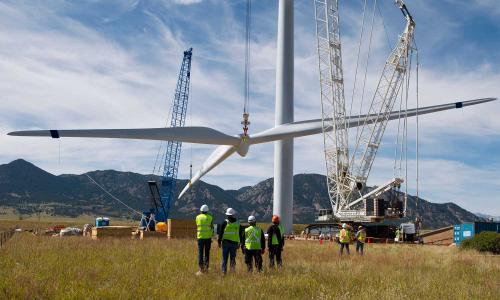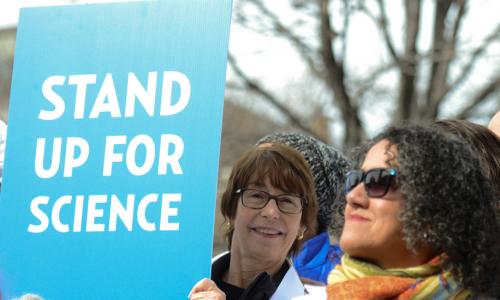Table of Contents
The continued production and use of fossil fuels threatens our climate, public health, and human rights. A fossil fuel phaseout is necessary to build a healthier, safer, and more just world, and any plausible scenario to meet global climate goals demands dramatic reductions in fossil fuel use, in this decade and beyond.
A fossil fuel phaseout isn't just a hypothetical good idea. It's a process that's already underway, with cleaner and safer energy solutions cost competitive and widely available.
Phasing out fossil fuels and replacing them with clean energy solutions—including direct electrification, renewable energy, energy efficiency and demand flexibility, energy storage, as well as societal changes that lower energy demand—is the primary requirement for meeting our climate and justice goals.
We can and must get there—and the time to accelerate the transition is now.
Why phase out fossil fuels?
Addressing the climate crisis
Human-caused climate change—primarily from burning fossil fuels—is the main driver of the rising trend in global average temperatures. Climate impacts, including deadly heatwaves, floods, and wildfires, are here and rapidly worsening, imposing a significant toll on people, ecosystems, and the economy. The science shows we must cut emissions aggressively and move toward a phase out of fossil fuels to limit these harms and secure a livable future.
Protecting public health and the environment
The extraction, refining, distribution, combustion, and disposal of fossil fuels all create serious public health and environmental risk—pollution of our air, water, and land. Fossil fuel pollution is a major contributor to heart and lung disease, asthma, and cancer.
Upholding equity and justice
The fossil fuel-based energy system reflects and exacerbates deep inequities of race, class, health, income, and political power. The harms of the fossil fuel industry disproportionately affect people who have been historically disenfranchised.
On the global front, wealthy nations like the United States have contributed most to historical fossil fuel emissions; resulting climate impacts are being experienced disproportionately by people in developing countries.
Holding the fossil fuel industry accountable
The fossil fuel industry is responsible for the majority of global warming emissions—and has for decades used disinformation and political influence to delay and block climate action and lock the world into fossil fuel dependence. These companies and their political allies are one of the biggest obstacles to a just transition to a clean energy economy and a safer, livable future.

What does a fast, fair global phaseout of fossil fuels mean?
- Fossil fuels: Coal, oil, and gas—at all phases of their production, use, and disposal.
- Phaseout: A rapid and steep decline in the production and use of fossil fuels, with a goal to get to zero. While there are still some technical hurdles to a complete phaseout, we can get most of the way there with a primary focus on deep, direct cuts in fossil fuel production and use in this decade and beyond.
- Fast: On a timeline consistent with the best-available climate science and the goals of the Paris agreement, considering technological feasibility, and prioritizing actions that will achieve deep, direct emissions reductions in the next few years and enable a dramatic acceleration of emissions reductions over the decades that follow.
- Fair: Economically, environmentally, and socially just, centering people over-burdened by fossil fuel pollution and climate change and those most affected by the economic disruption of a transition away from fossil fuels, including fossil fuel-dependent workers and communities; striving to correct inequities caused by historical and ongoing pollution burdens; and providing and preserving access to safe, affordable, and reliable energy for everyone.
- Global: Acting together, nations must limit the worst of future climate impacts by cutting global carbon emissions in half by 2030 and achieving net-zero emissions by 2050. This phaseout must take place across the whole world, but the United States and other wealthy nations who have contributed the largest share of emissions must set the pace of their phaseout based on their historical responsibility and greater capacity, as well as their responsibility to provide climate finance to enable a rapid fossil fuel phaseout and a ramp-up of clean energy solutions in low- and middle-income countries.
Uncertainty at the margins cannot be an excuse to avoid actions that must be taken immediately.
We can make real progress, starting now
This transition is already underway. But we can, and must, do more to accelerate the pace of progress.
- UCS modeling shows that, through smart, comprehensive policies, we can reduce heat-trapping emissions by more than 50% below 2005 levels in 2030 and to net zero no later than 2050. A fossil fuel phaseout is central to meeting these climate goals, and our modeling results show that with ambitious investments and policies, it would be at least 50 percent complete by 2040 and 80 percent complete by 2050.
- Questions remain about how and when we can get to a 100% phaseout but the solutions to get us most of the way are currently available, and they need to be deployed now. Transformative shifts in governance and decision-making related to our energy choices are also crucial. Uncertainty at the margins cannot be an excuse to avoid actions that must be taken immediately.
- The default position of governments at every level across the country should be to reject the expansion of fossil fuel production and the buildout of infrastructure that risks staying in place for decades to come. Governments and businesses across all sectors should steadily reduce their fossil fuel production and consumption while planning for a fast and fair phaseout.
- Approaches like carbon capture and storage (CCS), carbon dioxide removal (CDR), and alternative combustion fuels may be a limited part of how we meet our long-term climate goals, but they aren’t likely to play a material role in meeting 2030 targets, they don’t fully reduce the environmental injustices and public health harms of fossil fuels, and they are not a substitute for the immediate and sharp reductions in fossil fuel production and utilization that we know are necessary now.
- To advance a fast and fair phaseout, policymakers and regulators must oppose and dismantle the disproportionate political influence of the fossil fuel industry over environmental, land use, and energy policy, alongside enacting policies and regulations to bring about a decline in the use of fossil fuels. The fossil fuel industry has shown time and time again that it can’t be trusted to lead this transition.
The default position of governments at every level across the country should be to reject the expansion of fossil fuel production and the buildout of infrastructure that risks staying in place for decades to come.
UCS is working to secure a phaseout of fossil fuels
An economy based on clean energy will require both ambition and careful planning—and it is within reach! Investments in clean energy, efficiency, and electrification are already underway, accelerating rapidly and set to grow even faster thanks to recent federal and state policy changes. For this transition to be fair and just, policies must also continue to evaluate the full scope of fossil fuel harms and ensure a comprehensive set of solutions, including changes in governance and institutions.
Below are just a few ways in which our work is enabling a transition away from fossil fuels:
- UCS has successfully advocated for policies to promote electric cars and trucks and reduce the use of gasoline and diesel in our transportation system including strong fuel economy standards during the transition away from fossil fuels.
- UCS has successfully advocated for a phase down in fossil fuel use in the power sector through federal and state-level legislative engagement and regulatory intervention for decades.
- UCS has deeply engaged in federal rulemakings to push forward the power sector transition, including advocating with the Department of Energy, Environmental Protection Agency, and Department of the Treasury to clean up polluting power plants and facilitate the transition to clean energy.
- UCS has advocated for grid infrastructure and market reforms at Federal Energy Regulatory Commission that enable the rapid buildout and integration of clean energy solutions, with inclusive participation from community stakeholders.
- UCS and our allies are continuing to hold fossil fuel corporations and their enablers accountable for decades of disinformation that impeded and continues to delay action on climate change—and for the resulting, escalating damage they knew would occur.
- UCS is playing a lead role with civil society groups to help secure bold and just global climate action at the UN climate negotiations, including through advocacy for the US government to commit to its fair share of global climate action.
View a more complete list of UCS accomplishments here.




